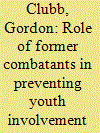| Srl | Item |
| 1 |
ID:
188012


|
|
|
|
|
| Summary/Abstract |
One of the most important legacies of the “Troubles” in Northern Ireland and the ensuing 20 years post-peace-process era, heralded by the 1998 Good Friday Agreement, is the rise of complex and diverse Republican and Loyalist paramilitary groups engaging in acts of terrorism and a wide range of organized criminal and cross-border activities. Yet, little scholarship has been dedicated for examining the nexus between terrorism and organized crime in Northern Ireland or for accurately understanding the role that paramilitaries play in organized crime and their dynamic interactions with organized criminal groups. Informed by empirical evidence and qualitative interviews with government agencies in Northern Ireland, it is this important gap in scholarship that this article aims to fill. It does so by developing a new terrorism-organized crime model which reveals a range of different types of crime-terror interactions in Northern Ireland. The article concludes that national terrorism-organized crime models, and the Northern Ireland model in particular, albeit with variations to its constituent components to accommodate local situations, are most appropriate for capturing intricate and dynamic interactions between these two phenomena across diverse environments rather than existing models designed for universal application.
|
|
|
|
|
|
|
|
|
|
|
|
|
|
|
|
| 2 |
ID:
145823


|
|
|
|
|
| Summary/Abstract |
The article engages with emerging debates on the potential role returning Islamic State fighters may have in preventing violence and whether nonviolent radical ideology acts as a conveyor-belt or firewall to violence. Rather than focusing on former combatant ideologies, it demonstrates how framing processes—not ideology per se—are more salient indicators of whether former combatants will act as conveyor-belts or firewalls to violence. The analytical framework developed for analyzing framing processes is then applied to the case of Northern Ireland. It argues that ideology shapes and constrains the type of antiviolence framing that may emerge, which provides a middle ground between the two perspectives in the literature. Furthermore, the article highlights the importance of network structures, incentives, and opportunities insofar as these can shape antiviolence framing and improve resonance among audiences. While recognizing the differences between cases, the framework is then used to argue that former Islamic State combatants can play a preventative role depending on whether their antiviolence framing is based on durable structural conditions, de-glamorizes violence, and is supported by networks that incentivize its diffusion—not on whether they have denounced their ideology.
|
|
|
|
|
|
|
|
|
|
|
|
|
|
|
|